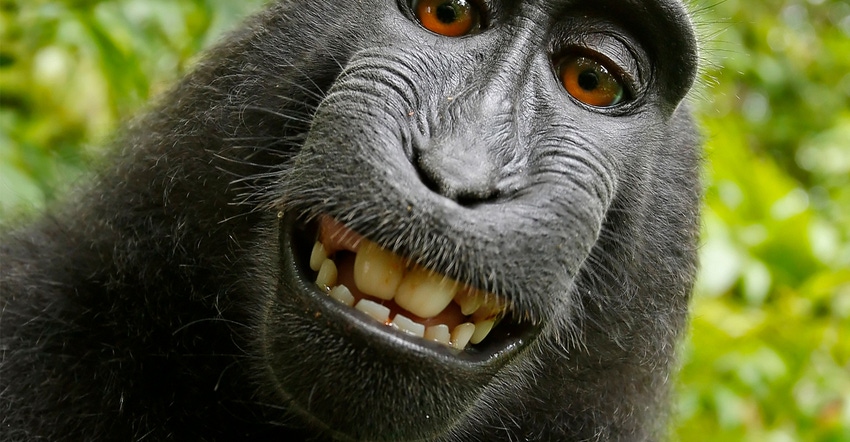
Does a monkey have the ability to sue you? Think about it.
If a monkey has the capability to go to court, do your cows, hogs, chickens?
In a 41-page opinion and a concurring opinion in part from the United States Court of Appeals for the 9thCircuit in San Francisco issued April 23, 2018, it is hard to read without either laughing or developing a deep concern that this court in particular may have lost all common sense.
The 9thCircuit panel affirmed a district court in California, which dismissed claims brought by a monkey and the panel stated “…that the animal had constitutional standing but lacked statutory standing to claim copyright infringement of photographs known as the ‘Monkey Selfies’.”
The 9thcircuit court has gained a reputation as being the most out-of-touch court in the country.
Sure, this is laugh-out-loud funny, but it could have serious potential consequences.
This is a case determining whether a monkey may sue humans, corporations or companies for damages arising from copyright infringement. The 9thCircuit panel declares, “Our court precedent requires us to conclude that the monkey’s claim has standing under Article III of the United States Constitution.”
Before you have a stroke reading this, the court quickly included that “Nonetheless we conclude that this monkey – and all animals, since they are not human – lacks statutory standing under the [United States] Copyright Act.”
Monkey selfies lead to book
The subject is 7-year-old monkey Naruto, living in Indonesia. Accord to the court, in 2011, a wildlife photographer left his camera in a wildlife preserve. The monkey apparently found the camera and took several photographs of himself. Apparently the monkey had great fun as he smiled at the camera while pressing the shutter button and apparently even posed in taking his own photographs. The photographer and several other parties took these monkey-produced photographs and published them in a book entitled “Monkey Selfies.”
In 2015, PETA (People for the Ethical Treatment of Animals)filed a federal court complaint that the monkey’s photographs being published violated his rights under the copyright infringement act. PETA claimed that one of the employees had known this monkey and studied its actions since its birth. The federal complaint claims PETA is the “largest animal rights organization in the world; and ‘has championed establishing the rights and legal protections available to animals beyond their utility to human beings…”
The photographer and his colleagues fought back against PETA, stating that the complaint did not state enough facts to establish standing under the U.S. Constitution. Furthermore, the Constitution did not allow such a lawsuit nor did the Copyright Act.
The U.S. district court, in essence, said the case was frivolous and threw it out because the monkey did it, nor could it establish legal standing under the copyright act.
The monkey’s ‘next friend’
PETA claimed it could represent the monkey because it was a “next friend.” The court stated, and get this, “…because PETA has failed to allege any facts to establish the required significant relationship between a next friend and a real party in interest and …because an animal cannot be represented, under our laws, by a next friend.”
In general, a “next friend” can litigate for another party when that party is unable to litigate his own cause. Generally there must be mental incapacity, lack of access to the court, a real disability, or have a signification relationship to be a next friend, and be dedicated to the best interest of the party.
In this case, PETA did not claim to have a significant and close relationship with the monkey, which was any more significant than its relationship with other moneys. Thus PETA could not claim to sue and prove a significant relationship requirement as the monkey’s best friend.
Yeah, you read that right.
The court goes on to engage in extensive discussion about U.S. Supreme Court cases discussing next friend standing. It concludes there must be a significant relationship between the two parties to have a significant relationship to prevent against abuses.
At this point in the case, one is simply shaking one’s head. High-level legal minds are paid to do this stuff.
The settlement
The Court, in a footnote, describes a settlement where the photographer who lost his camera had recently agreed to pay a quarter of his earnings from the monkey’s selfie book to charities in Indonesia who protect monkey habitat. The court then speculated whether the monkey “…might initiate an action for breach of confidential relationship against his (former) next friend, PETA, for its failure to pursue his interest before its own.”
After reading this decision, a reasonable person can only conclude that the United States Supreme Court is correct when it sees a 9thCircuit opinion it generally reverses the opinion.
The opinions of the author are not necessarily those of Farm Futuresor Farm Progress.
About the Author(s)
You May Also Like




